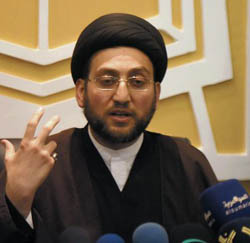Between Tehran and Washington

About 3 months ago it was reported that The Supreme Council for the Islamic Revolution in Iraq (SCIRI) has decided to replace Seyyed Abdul Aziz Hakim with his son Ammar Hakim for the leadership of the party.
Some news agencies stated that the SCIRI has finalized its decision to select a successor for Abdul Aziz Hakim for the Council’s leadership. According to these news agencies the Supreme Council had chosen Hakim’s successor during the Abdul Aziz Hakim’s short stay in Iraq and before his return to Iran to continue medical treatment.
Soon after the release of this news, speculations were made on the future of SCIRI as the largest Shiite party in Iraq’s parliament and the possibility of taking some twists in the political approach by the Hakim Junior. The speculations mainly focused on Hakim’s dissimilarity with his father in supporting Iran’s policies in the region, which can lead to closer ties with U.S.A.
These speculations were fueled recently as Mehdi Army forces attacked bureaus of Supreme Council in Karbala, a move that bolstered the position of this party in political circles and even among the religious leaders of Iraq.
Therefore some analyzers believe that Washington will pay more attention to SCIRI and its chairman, Ammar Hakim and will make new attempts to establish close ties with him.
Ammar Hakim has educated in Iran’s seminaries and although he’s not in line with seculars who were once America’s hope for political and military leadership of Iraq, but the party led by his father is one party in Iraq having closest relationships with United States.
Ammar moved to Iran with his family in 1979, the year that the 8-year war between Iran and Iraq broke out. Even though he has spent more than half of his life in Iran, in Washington they see a little chance for his cooperation with Iran, regarding the concerns and interests of this 36-year old clergyman about Iraq.
As Ammar says, it’s beneficial for Iraq to have friendly relationships with both Iran and United States. He also opposes a sudden withdrawal of American forces from his country and he agrees with the U.S-backed proposal of the Iraqi government for distributing oil revenue and reaching an agreement with the Sunni politicians of Saudi Arabia. Also on the incompetence of Nuri Maliki’s cabinet in controlling Iraq, he believes that the problems of Iraq shouldn’t be attributed to only one person and therefore he’s against the recent measures for deposing Maliki.
During the recent months, Ammar has played a more important role in leading his respective party and has proved that he can be a rightful successor to this father who’s now struggling against lung cancer.
However, Iraq is witnessing the eye-catching presence of Hakim in the Supreme Council in crucial days. Although the largest Shiite party in Iraq’s parliament, it has not achieved the influence Muqtada Sadr’s anti-American group has among public.
Ammar Hakim’s abilities are vital at a time when United States truly needs the support of Iraqi groups to continue of its presence in Iraq. Although highly familiar with the military skills, Badr Army that is under the control of SCIRI is unlikely to be compared with the multitude of Mehdi Army led by Muqtada Sadr. However White House has found out that due to some parameters, the new leader of the Supreme Council can be an influential weight to confront Sadr and his forces, especially at a time when the Mehdi Army has been ordered to suspend its military activities for the next 6 months.
Ammar Hakim and Muqtada Sadr are both at the same age range and both are scions of renowned and respected families in the religious history of Iraqi Shiites and among the clergy community. The two families have been also old rivals in taking over the leadership of Shiite majority of the country.
On the other hand, Ammar and Muqtada have outward differences which attract different groups of people. Hakim is the son of an insightful orator, willing to speak more in classic Arabic and with an elaborate style while Muqtada Sadr uses and informal language in his speeches which draws the attention of Iraqi lower class.
Despite all that was said, some analyzers believe that it’s too soon to judge about the approach that’ll be taken by Ammar Hakim and it cannot be predicted whether he will follow his father’s footsteps or he is thinking of a new path for the future of his respective party.
Currently we must await other developments in the political procedure of Iraq, including the fate of Nuri Maliki’s cabinet. Also we shouldn’t overlook the possibility of Abdul Aziz Hakim’s death in analyzing the future position of Supreme Council for the Islamic Revolution in Iraq.

